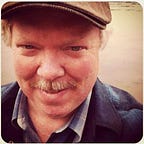Redeemed in the Literature of Heroic Struggle
For the past several years, I have struggled to read books from front to back. I don’t like to admit it or even think about it, but I will admit it and think about it, and now that this pitiful disruption is behind me, I will mark this place in time, and hopefully, I can encourage others who may be faced with the same Internet-fueled attention surplus problem to slow down and read.
To break the scrolling spell, I looked to some masterful novels to fully command my attention, and over the past two months, I am happy to report that I have read several page-turners with powerful and memorable women heroes.
· The Four Winds by Kristin Hannah
· Caleb’s Crossing by Geraldine Brooks
· The Last Ballad by Wiley Cash
· American Dirt by Jeanine Cummins
These four books all have plots that center on timeless issues like worker’s rights, migrant’s rights, and women's rights, also knowns as equal rights and human rights. In the hands of these immensely talented authors, the imagined lives of Elsa Martinelli, Bethia Mayfield, Ella May Wiggins, and Lydia Quixano Perez are emblematic, and their suffering — like the very real suffering that it is based on — is made painfully raw and immediate for the reader.
How will Lydia escape the gang of thugs who wants her and her young son dead? Same with Ella May and Elsa — how will they feed their hungry children tonight? And how does Bethia manage to endure one humiliation after the next, all because she’s a girl and not a boy?
“Poverty was a soul-crushing thing. A cave that tightened around you, its pinprick of light closing a little more at the end of each desperate, unchanged day.” -The Four Winds
With smooth writing and elegant style, these four writers immerse their readers in worlds that matter a great deal today. The 17th-century settlers in Massachusetts described in Caleb’s Crossing matter because they shaped an early version of America. Same for the labor struggles in the cotton mills and farmer’s fields of the early 20th century described in The Last Ballad and The Four Winds. Same for the forced (by gang violence) migration of hundreds of thousands of people from Central America and Mexico described in American Dirt. These are stories in our news and in our history books, but the four novels are far from journalism or academic treatises. These novels are significant precisely because they compel the reader to care deeply about other people.
How much can a person take? It’s a question I found myself asking repeatedly as I made my way through the books above. How much injustice must a person face in one lifetime? The abuse of women, workers, and migrants wasn’t invented on our watch. Nevertheless, it is up to us to do what we can today to stand up for women, for workers, for migrants, for children, for the earth.
In books as in real life, human beings prove to be amazingly resilient. Heroes real and invented are capable of love in the face of terror, poverty, and destruction and, for me, this is where hope lies. We can become heroes by loving fiercely. When we do, this lifts us up and makes us stronger champions for justice, and we all know there will be no peace until first there is justice.
